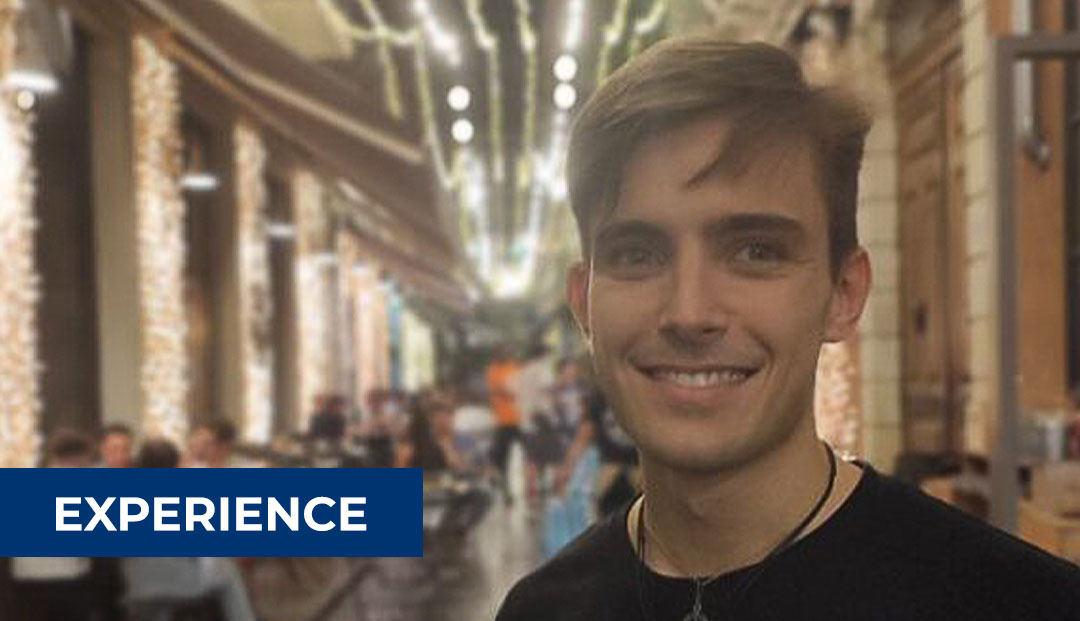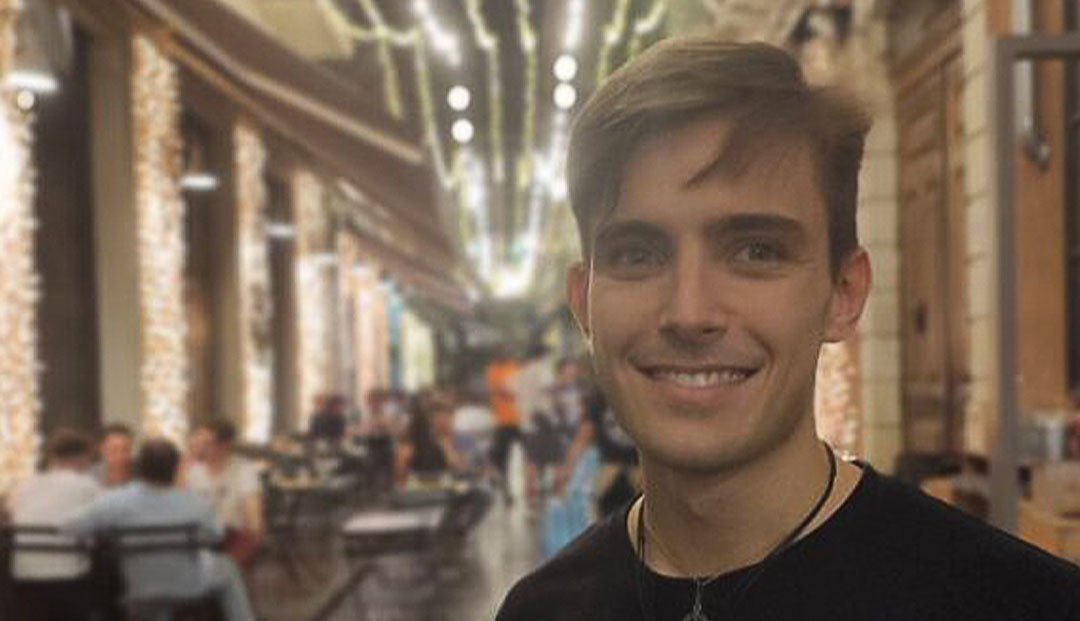
05 Dec EU4EU Internship experiences: MARCO BATTISTI


Rome, 05 December 2022
Leaving Italy, precisely the University of Padua, and arriving in Cyprus for a new work and life experience, full of expectation and enthusiasm: this is the story of Marco Antonio Benedetto Battisti who, enrolled in the second cycle of studies in Law, Political Science and International Relations, landed at the Cross Culture International Foundation Cyprus after winning the EU4EU Erasmus+ program scholarship.
1 – Why did you decide to join the EU4EU program?
My Master’s Degree in International Relations has in plan a curricular stage to be completed: given the scope of my studies, I thought it would’ve been much better to do it abroad, and the EU4EU program pre-registration phase started exactly while I was thinking about finding a place for my stage. It’s been a mix of luck and thought.
The opportunity of getting a scholarship helped me a lot since I could’ve never done this internship without help: although I chose Cyprus as a destination also out of cost-of-life considerations, my economic situation would’ve never sufficed to support my time abroad.
2 – Was it easy to join the program?
Each phase was well-explained and I had the right time to complete all the necessary steps, although because of the date of the beginning of my internship the communications between my university, the portal and the Host Organization had been a little rushed.
3 – Tell us your experience about living in another country (finding home, social relationships, friends, language, ecc…)
It’s been my first medium-term experience of living in another country, although I’m already studying in a different city, so I already had some clues on how to live, or at least what to expect in living in another context.
Even before departure, I tried to solve at least the problem of the accommodation, for which I received the help of the Host Organization which provided it for me. When I arrived, I had roommates and for the duration of the internship at least one of them was Italian like me. Although a part of me would’ve preferred a more challenging life on the language side, I understand that it helped me a lot, especially since other problems and challenges came both from the work and house side. I could reach my girlfriend by phone and it gave me much strength, on the other side the roommates have always been kind to me and helped me be more at ease at home. I could do the same in this regard, and life together proceeded smoothly on this side, we managed to organize both the care and maintenance of the house and the tasks of each of us. This part of the experience made me understand how is important not to be alone in any place and how having nationals around helps us get more comfortable and be able to help each other. We also had other roommates from different countries and genders, and we managed to get along quite well and share more of ourselves while keeping the house a safe space for everybody, although I feel like I could’ve done a little more.
4 – Tell us your experience about working in another country (it was hard/simple, my supervisor was great/bad, my colleagues were great/bad, difficult to understand, ecc…)
The workplace was quite relaxed, as the hours and the ways of working: the atmosphere was more of a family than of an office, we all knew each other, and while this helped in getting more in confidence with the work and understanding how things are done, it sometimes barred from making some things clear and definitive. As an example, the reliability and efficiency I showed at the beginning created as a consequence an image of me who could do anything, and this sometimes brought more workload than the others. I understood the difference between these two roles, intern and volunteer: through an ESC training I attended, I learnt of the different rights, benefits and duties they have. It frustrated me a little since I saw the better position my colleagues sometimes had than me, but I managed to never make it personal: on the opposite, they’ve been always the most helpful, mainly knowing themselves the disparity that sometimes emerged. We shortly became friends and managed to share in a safe way parts of our cultures throughout my period there.
One of the main tasks of the Host Organization was to teach English and Greek to refugees and migrants and to organize cultural exchanges with young people all over the EU territory and beyond: while I didn’t know enough Greek, I managed to even practice my French to teach English to them, and it’s been a quite fun and positive experience, although very demanding both as mental and physical energy. I became friends with some of the students and we exchanged contacts to keep in touch.
5 – How important do you think it is for a university student to get an internship in Europe?
I think it’s a fundamental part of our education: being able to visit different countries helps us to put in perspective our national situation. We can understand the luck we have in many respects as Westerners, and what we have more than many people, but we can also see the problems and lacks that our country often has and make ourselves more aware of the problems and struggles that exist around us, sometimes even finding they’re not so different from ours. Many times, especially as young people, we face the same obstacles and obstructions from the world around us in the job market, and the opinion older people sometimes have of us as being still “too young” can be changed also through these experiences, since the EU works a lot to tackle this issues; we need to be more aware of it, as it can be a powerful ally and an important tool to build a better future for ourselves. These are opportunities we do not see often, they’re not always well advertised, and we risk losing them so our experience is also very important for those who’ll come after us.
6 – What do you think will be the advantages from this experience?
I think I’ve returned changed in some ways: I know more of myself, as the challenges even in the housing context made me realize many aspects on which I need to work to be a better person. I saw myself in a workplace with people from different countries, made new friends and learned many things from them, about how to work and how to live in the real world. Being my first experience abroad and my first work experience has been much like a maturity ritual, as I understood the challenges, the struggles and the problems one can face in a world which is not perfect, as we all know, but now that I started living more in it feels much more real.
Doing it abroad also allowed me to visit a different country and see with my eyes the traces of the history and the present which I studied, and I explored the country searching for the traces and elements I know from my knowledge. It’s a great opportunity to live it more like a person with a job and routine tasks, as it put me nearer the real life.
7 – Did you get what you wanted from this opportunity?
Not everything, as maybe I would’ve liked to work more with what I studied and put my knowledge and skills to use, but on the other side, I got other skills, other life experiences and other pieces of knowledge and more trust in myself and people which a part of me surely would’ve wanted, sooner or later.
8 – Will you participate in the EU4EU program in the future?
I fear I’ll not be eligible anymore for it, although this will mean I’ll get my degree, so it’s not completely a bad thing!
9 – Would you suggest another student to join the EU4EU program? Why?
Definitely, for all the reasons I mentioned above: these kinds of programs are the main tool to gradually integrate ourselves into a world that seldom gives us step-by-step tutorials and assistance. Thanks to these funds and programs, we have the opportunity to experience both what we want for our future and to think ad work outside the box, while giving ourselves a new challenge. It’s very different from studying abroad, I think, because this is more real, in a way. If we’re also studying, as happened with me, we need to harmonize and manage the two aspects of our life, a skill we’ll definitely need in our life after our studies, or even during them: it’s not unusual to work during our university years to support our career. The EU4EU program has been easy to join, has a good portal and a quick, available assistance service and has the right amount of funds to make ourselves as comfortable as possible during our journey, but on the other side, we can make the most out of it.
EU4EU Team
